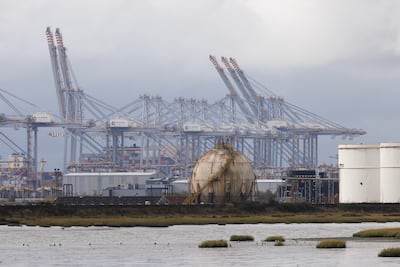Britain's Foreign Secretary David Lammy offered China “mutually beneficial co-operation” on technology and climate change on Friday as he began a two-day visit signalling a conciliatory line towards Beijing from the UK's Labour government.
Mr Lammy called for the two countries to work “constructively” together, while his Chinese counterpart Wang Yi said relations were at a “new starting point”. Both sides have indicated interest in China helping to deliver Labour's flagship economic growth and clean energy agenda.
China is the world's biggest manufacturer of solar panels, electric cars and batteries, all of which the UK needs to meet its net zero goals. But Chinese investment is viewed cautiously in Europe due to concerns over security, espionage and political leverage.
Mr Lammy has sounded out Labour foreign policy thinkers as he prepares an “audit” of the UK's policy towards China. A “golden era” proclaimed by David Cameron's government in 2015 has since given way to tensions on a host of issues including Hong Kong and the war in Ukraine.
Nonetheless, discussions in Labour circles have heard that Britain would find it difficult to replace China in its quest for clean technology. “It’s about lowering the cost of carbon transition and China can help the UK to do that,” said John Johnson of commodities analyst CRU China.
“It's also about the long experience Chinese companies have of the supply chains and operating with high efficiencies,” Mr Johnson said. “It would be difficult to build a battery supply chain with high efficiency in the UK.”

After talks with Chinese Communist Party officials in Beijing, Mr Lammy will head to Shanghai with a British business delegation on Saturday. He acknowledged “areas in which we have different perspectives”, but he said he hoped the two countries could “find space to discuss such areas constructively”.
He said there was scope for “mutually beneficial co-operation” between the UK and China in areas such as climate, energy, science, trade and tech, while cautioning that Britain would “always put its national interests and national security first”.
Security questions
Some Labour thinkers warn of rights abuses in China and the risk of economic ties being overshadowed by politics, for instance if a war breaks out in Taiwan. “The reality is that the trust between the UK and [China] right now is very low,” said Sam Goodman of the Labour-aligned China Strategic Risks Institute.
He said Britain should consider the need for US investment in Labour's new National Wealth Fund, which will invest at least £5.8 billion ($7.57 billion) in green hydrogen, carbon capture, ports, gigafactories and green steel. White House pressure led to Britain cutting China's Huawei out of its 5G mobile network.
A Chinese role in British ports “would be a very hard sell” and there may not be a “huge appetite for Chinese investment in the steel sector”, Mr Goodman said. However, he said that “in the short term there might have to be some dependency on China” while Britain develops a new industrial strategy.
“Even if we do put strenuous requirements on electric vehicle producers to produce them in the UK, or wherever, there is still going to be a preference for using Chinese batteries and that is something that policymakers are going to have to think about,” he said.

Labour's opening to China has already raised the hackles of hawkish Conservative MPs. On the eve of Mr Lammy's visit, Conservative leader Rishi Sunak pressed Prime Minister Keir Starmer over Chinese military exercises, support to Russia and the arrest of a pro-democracy campaigner in Hong Kong.
Mr Starmer said Britain will “co-operate where we can as permanent members of the UN Security Council on issues such as net zero and health and trade, compete where we have different interests, and challenge where it is needed to protect national security, human rights and our values”.
An editorial in China's state-owned Global Times said Chinese companies “remain positive about investing in the UK”, including in “emerging areas such as health care, green technology, green finance, new energy, the digital economy and creative industries”.
Mr Lammy will meet Vice Premier Ding Xuexiang, who is responsible for science and technology, as part of his trip. Mr Wang said he hoped to take ties with Britain into a “new stage of stable development”.
“China-Britain relations … now stand at a new starting point,” the Chinese Foreign Minister said during a meeting with Mr Lammy at Diaoyutai State Guesthouse in Beijing. “Competition among major powers should not be the backdrop of this era.”


